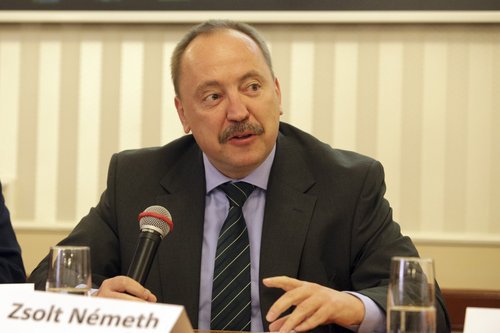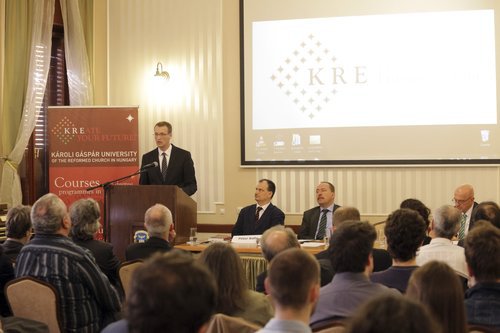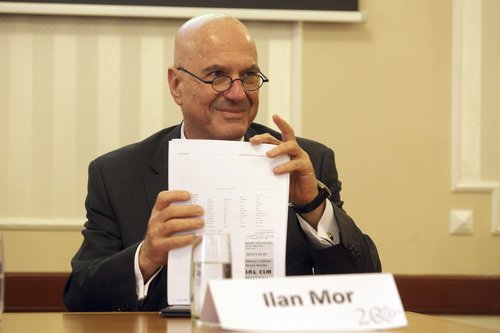The Minister of State for Foreign Affairs, Zsolt Németh, opened the Károli Gáspár University conference on Judaism in Hungary in the 20th and 21st centuries with this sentiment: “You cannot address the bright future without the dark past,” however he continued, “That future is at risk when in the name of Christianity, people speak from the dark past…from a place of intolerance...” In his speech, the state secretary stressed that anti-Semitism is both anti-democratic and anti-Hungarian, as well.
The conference welcomed university students, lecturers and several honored guests, including Israeli Ambassador to Hungary Ilan Mor, State Secretary Zsolt Németh, Vice Rector of the Jewish Theological Seminary Judit Komoly, General Secretary of the Reformed Church in Hungary Zoltán Tarr and pastor of St. Columba’s Scottish Presbyterian Church (formerly the Scottish Mission) Rev. Aaron C. Stevens.

There were two lectures given in the afternoon session. The dean of the theology faculty, Dr. József Zsengellér, gave the first presentation, entitled "Coexistence and Cooperation: 164 Years Jewish Relations of the Theological Faculty of Károli Gáspár University of the Reformed Church in Hungary," and Associate Professor Dr. Zalán Bognár followed with his lecture, "Genocide - Life Saving."
Among the greetings were Judit Komoly, who spoke warmly of the strong bond between the Jewish Theological Seminary and Károli Gáspár University manifested through the institutions’ partnership agreement, and Zoltán Tarr, who spoke on behalf of the presiding bishop of the RCH, Gusztáv Bölcskei.

“It is with the spirit of cooperation and mutual acceptance that I look at the presence and contribution of the Jewish people, I see them as an integral, interwoven element of everyday life in Hungary…However, as we are looking at our present situation and trying to focus on the future, we cannot ignore the shame of the past. There were times, especially during the Shoa, when we reformed people and church rejected our community with the Jewish people, or – what is equally sinful – were not ready to do the utmost. It is indeed a heavy burden and requires us to humbly learn from the mistakes,” Bishop Bölcskei expressed in his letter.
The bishop ended with a call to condemn the “unacceptable voices” in Europe and in Hungary, which are raised against Jews and other minorities, and his hope that this conference serve the responsibility of commemoration, the education of younger generations and to further deepen the culture of acceptance.
Israeli Ambassador Mor echoed this call to stand against anti-Semitism in Hungary and all over the world: “I’m not talking about guilt. I’m talking about responsibility, and the younger generation has a responsibility.”

The ambassador attended the event, which he considered of great importance, despite current Israeli diplomatic strikes, because, as he said, Israel is the only Jewish state and it feels a responsibility to uphold all Jews around the world. Furthermore, he sees the encouraging bilateral relations with Hungary that have been cultivated over the last 25 years, since resumed relations between the two countries, as seeds to be sowed, which in the future will blossom and bear fruit.
Rev. Stevens spoke shortly about Jane Haining, the Scottish missionary who was taken from the Scottish Mission in Budapest to Auschwitz and ultimately to her death. He commended the conference for promoting the spirit of tolerance, acceptance and cooperation, which Jane Haining lived and died defending.
“As so many of us work to promote cooperation among different ethnic groups and religions,” Rev. Stevens said, “it was good to hear how what we do is not so much breaking new ground as continuing a tradition and nurturing long-standing relationships. If repentance can be described as turning from one way of life to another, this event focused on the path we turn to in order to ensure the Holocaust is not repeated.”
Amy Lester
photos: Vargosz